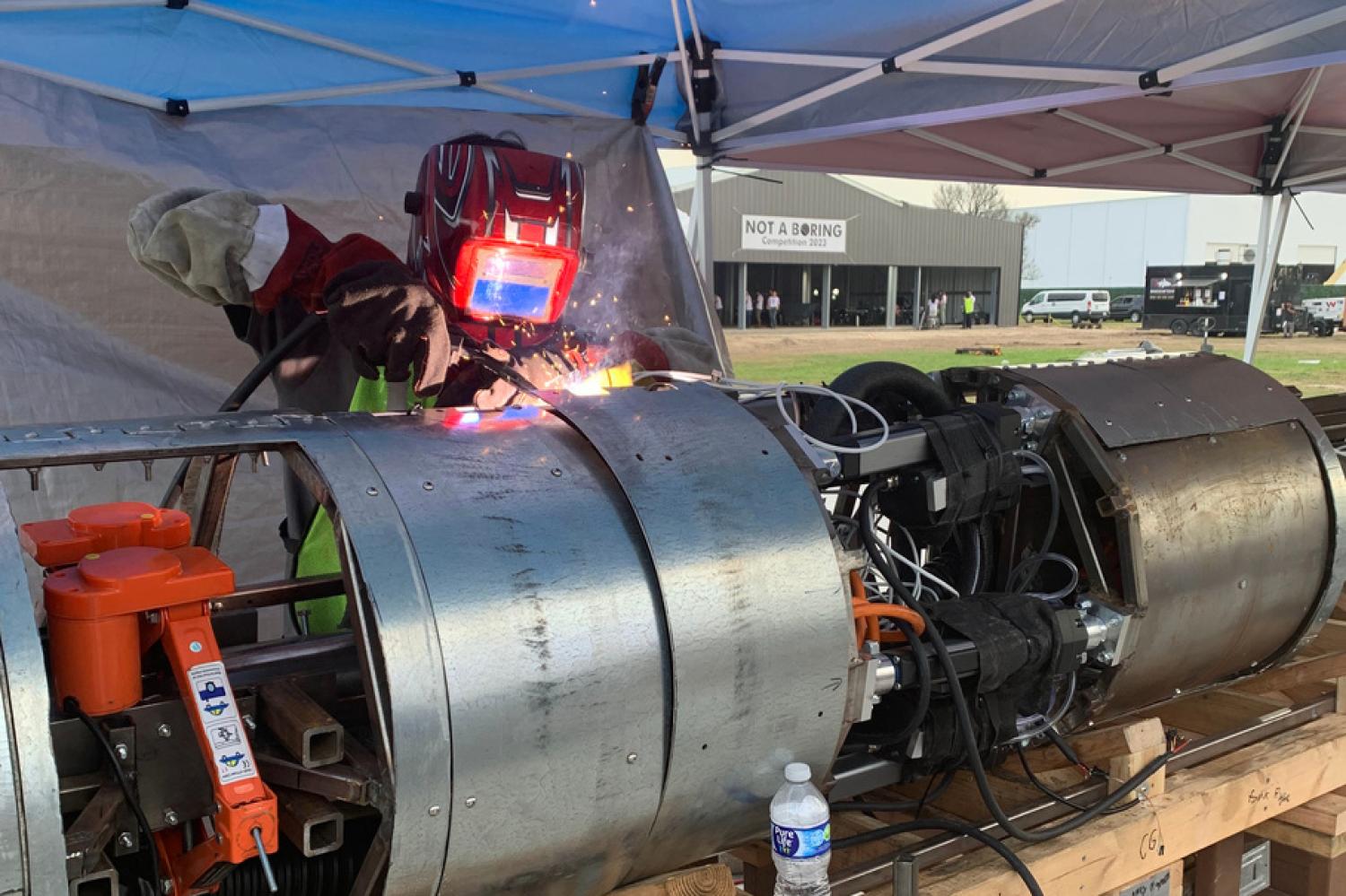CU Boulder students compete in international hyperloop competition

Headline Image: The team with their digging machine at the competition.
Above: Team member Arjun Mody welding modified gripper structures to the machine on site.
Want more CU Hyperloop info?
Cole Kenny is focused on an unusual place for an aerospace engineer: underground.
A PhD student in the Ann and H.J. Smead Department of Aerospace Engineering Sciences at the University of Colorado Boulder, Kenny is applying lessons he has learned about aeronautics and astronautics to a subterranean endeavor: the Boring Company’s 2023 underground tunneling competition.
“It’s been really exciting to be a part of this, and there is a lot of commercial potential for hyperloop and more generally moving transportation underground,” Kenny said.
For this year’s competition, the team built an impressive boring machine – 13 feet long and 2 feet in diameter weighing close to 2,000 pounds with another 1,000 pounds of supporting equipment including a transformer, large AC/DC rectifier, and ground station computer.
Their efforts have paid off. At the international competition in Texas, they took third place overall and won a special accuracy award despite problems that arose at the event.
Kenny has led the CU Boulder Hyperloop team since 2017. At the time, it focused exclusively on designing hyperloop transport pods. As the Elon Musk-driven initiative evolved from above-ground pods to advancing below surface boring, the team transformed with it.
“I was a little hesitant when the competition switched from hyperloop to tunnel boring, but aerospace skills are all directly transferable,” Kenny said. “CAD, structural analysis, avionics. It all applies.”
Kenny is one of more than a half dozen aerospace students on the team. In addition to aerospace, the 25-member group includes students from mechanical engineering, civil engineering, computer science, and the Leeds School of Business.
Over the course of the last two semesters, the team designed and refined their competition entry, knowing they were facing formidable challengers, according to aerospace junior and team member Max Balasubramaniam.
“Over 400 teams applied, but the competition has multiple down-selection rounds where you submit slides and a 120-page paper,” Balasubramaniam said. “We were one of five teams that made the final round.”
At the competition, the judges pushed the students to explain and defend all of their design choices.
“We had to pass pretty close to 100 independent safety checks for systems. Then the judges want to see a bit more analysis on something and you have to go back and look through more textbooks,” Balasubramaniam said.
In the end, only two teams were cleared to conduct actual digging. In a competition where the machines literally tear up the earth and require 480-volt power supplies drawing around 20 kilowatts, safety is paramount.
Despite being unable to dig, the team was praised by the judges.
“We take pretty big pride in how we design things from the ground up and understanding how everything works and works together,” Kenny said. “People have asked how we could win an accuracy award without digging, but the crux of that is how do you know where your machine is underground and where it is going to go. Our algorithms for guidance and navigation, and especially our understanding and mastery of them, impressed the competition judges.”
The accolades also include future job prospects. Multiple team members received internship and full-time position offers at the competition.
Kenny said the ultimate goal of the event is to push tunneling technology to make a great leap forward. Currently, tunneling machines can only dig about one mile every eight weeks. Speeding up that process could be revolutionary.
“We’re at an inflection point,” Kenny said. “Tesla changed the game for electric cars. SpaceX changed the game for rockets. The Boring Company could change the game for public infrastructure and transportation.”

